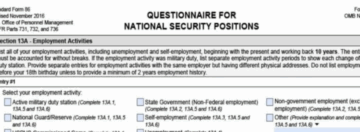Head Banging and Angry Outbursts in the Workplace Results in Clearance Denial

In Security Executive Agent Directive (SEAD) 4 under Guideline I; Psychological Conditions it states certain emotional, mental, and personality conditions can impair judgment, reliability, or trustworthiness. A recent Defense Office of Hearing and Appeals (DOHA) case involved a DoD contractor who was diagnosed with Autism Spectrum Disorder (ASD), previously known as Asperger’s Syndrome. Some individuals with ASD are highly functioning and can control the symptoms of this disorder. Others, however, exhibit periods of angry outbursts, bizarre behavior, chronic lying, anti-social tendencies, or even violent or suicidal behaviors. In this particular case the individual exhibited severe anti-social behavior in college and disrupted classes by repeatedly asking instructors same questions over and over. In his current contractor position he displayed concerning behaviors at work to include head banging on a wall, angry outbursts, crying, and chronic tardiness. Based on this information the DoD CAF declined to grant him clearance eligibility.
Subsequently the applicant appealed to DOHA claiming the DoD judge failed to apply mitigating factors and disputed the psychologist’s diagnosis that his condition affected his reliability and trustworthiness. It is noted the applicant opted to have the hearing based on the written record instead of appearing himself, thus the judge was not able to determine the sincerity and credibility of the applicant. Claims of not being able to get character references or communicate with company management because of COVID-19 measures did not hold sway with the appeals judge. The judge was quoted saying “when an applicant waives a hearing and chooses to have his or her case decided by a judge based on a written record, the judge has no ability to make a credibility determination based on observation of the applicant’s demeanor. Accordingly, a credibility determination based solely on a written record is not entitled to the same deference on appeal as a credibility determination based on observation of a witness’s demeanor.” The applicant also asserted DOHA should have contacted his Human Resources Office to obtain information on favorable employment references. Again, that is not the responsibility of the board. This case was pretty cut and dry and DOHA judge correctly upheld the denial of eligibility for a security clearance.



Interesting case, guideline I is not as frequent as financial issues but is very significant. I am interested in the new adjudicative criteria that will be developed per Trusted Workforce 2.0. I suspect mental and financial considerations will still be an issue.
Here is a very interesting passage you might miss if you don’t read the full article:
This seems to be a powerful argument for appearing in person when responding to an SOR.